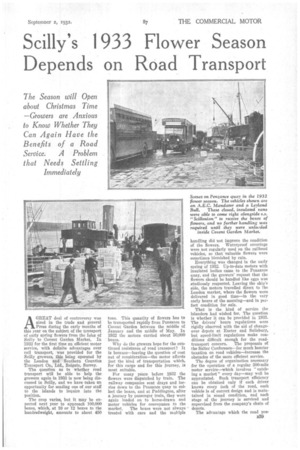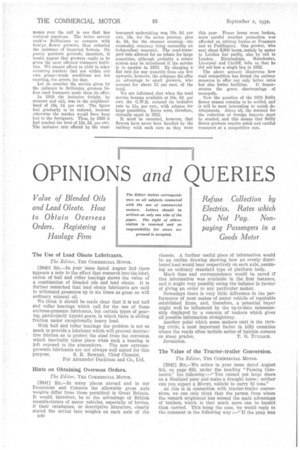Scilly's 1933 Flower Season Depends on Road Transport
Page 57

Page 58

If you've noticed an error in this article please click here to report it so we can fix it.
The Season will Open about Christmas Time —Growers are Anxious to Know Whether They Can Again Have the Benefits of a Road Service. A Problem that Needs Settling Immediately
AGREAT deal of controversy was aired in the trade and general Press during the early months of this year on the subject of the transport of early spring flowers from the Isles of Scilly to Covent Garden Market, In 1932 for the first time an efficient motor service, with definite advantages over rail transport, was provided for the Scilly growers, this being operated by the London and Southern Counties Transport Co., Ltd., Reigate, Surrey.
The question as to whether road transport virill be able to help the growers again in 1933 is now being discussed in Scilly, and we have taken an opportunity for sending one of our staff to the islands to inquire into the position.
The crop varies, but it may be expected next year to approach 100,000 boxes, which, at 10 or 12 boxes to the hundredweight, amounts to about 450 tons. This quantity of flowers has to be transported rapidly from Penzance to Covent Garden between the middle of January and the middle of May. In 1932 the motors carried about 50,000 boxes.
Why do the growers hope for the continued assistance of road transport? It is because—leaving the question of cost out of consideration—the motor affords just the kind of transportation which, for this cargo and for this journey, is most suitable.
For many years before 1932 the flowers were dispatched by train. The railway companies sent drays and lorries down to the Penzance quay to collect the boxes, and at Paddington, after a journey by passenger train, they were again loaded on to horse-drawn and motor vehicles for conveyance to the market. The boxes were not Always treated with care and the multiple handling did not improve the condition of the flowers. Waterproof coverings were not regularly used on the railhead vehicles, so that valuable flowers were sometimes blemished by rain.
Everything was changed in the early spring of 1932. Up-to-date motors with insulated bodies came to the Penzance quay, and the growers' request that the flowers should be handled like eggs was studiously respected. Leaving the ship's side, the motors travelled direct to the London market, where the flowers were delivered in good time—in the very early hours of the morning—and in perfect condition for sale.
That is the kind of service the islanders had wished for. The question is whether it can be provided in 1933. The drivers' hours regulations were rigidly observed with the aid of changeover depots at Exeter and Salisbury, but speed-limit regulations make conditions difficult enough for the road transport concern. The proposals of the Salter Conference—for much heavier taxation on road vehicles—increase the obstacles of the more efficient service.
The degree of organization necessary for the operation of a regular 300-mile motor service—which involves "catching a market" every day—may well be appreciated. Such transport efficiency can be obtained Only if each driver knows every inch of the road, each vehicle is of correct design and is maintained in sound condition, and each stage of the journey is serviced and supervised from the company's chain of depots.
The advantage which the road pos1339
resses over the rail is one that has national reactions. The better service ensues Seilionians to compete with fore4gil flower growers, thus reducing the incidence of imported flowers. On purely patriotic grounds, therefore, it would appear that growers ought to be given the most efficient transport facilities. We cannot afford to yield to other countries markets that are within our own grasp—trade conditions are too exacting, too severe, for that. Let us consider the service given by the railways to Scillonian growers before road transport made them its offer.
In 1919 the inclusive freight, by steamer and rail, was in the neighbourhood of 18s. id. per cwt. The figure had gradually to be reduced, because otherwise the market would have been lost to the foreigners. Thus, by 1928 it had reached the level of 12s. 2d. per cwt. The inclusive rate offered by the road
transport undertaking was 10s. 8d. per cwt. (6s. for the motor journey, plus 4s. 8d. for the steamer crossing—the steamship company being ostensibly an independent concern). The road-transport rate allowed for no rebate for large quantities, although probably a rebate system may be introduced if the service is to operate in 1933. By charging a flat rate for any quantity from one box upwards, however, the company did offer nu advantage to small growers, who account for about 75 per cent, of the total.
We are informed that when the road service becaaie available at 10s. 8d. per cwt. the G.W.R. reduced its inclusive rate to 1ls, per cwt., with rebates for large quantities. Rates were, therefore, virtually equal in 1932.
It must be recorded, however, that flowers have never been handled by the railway with such care as they were
this year. Fewer boxes were broken, more careful weather protection was afforded on railway lorries at Penzance and at Paddington. One grower, who sent about 6,800 boxes, mainly by motor to Lon-don but partly, also by rail to London, Birmingham, Manchester, Liverpool and Cardiff, tells us that he did not lose a single box in 1932.
The above account illustrates how road competition has forced the railway concerns to offer not only better rates
but also better facilities. It demonstrates the grave shortcomings of monopoly.
Now the question of the 1933 Scilly flower season remains to be settled, and it will be most interesting to watch developments. Above all, the demand for the reduction of foreign imports must be studied, and this means that Scilly flower growers require quick and careful transport at a competitive rate.




































































































